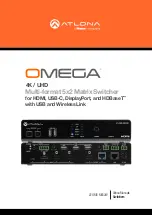
1-22
z
include
: Displays only the lines that match the regular expression.
A regular expression is a case sensitive string of 1 to 256 characters. It also supports special characters
as shown in
Table 1-5
.
Table 1-5
Special characters in a regular expression
Character
Meaning
Remarks
^
string
Starting sign,
string
appears
only at the beginning of a line.
For example, regular expression “^user”
only matches a string beginning with
“user”, not “Auser”.
string
$
Ending sign,
string
appears only
at the end of a line.
For example, regular expression "user$”
only matches a string ending with “user”,
not “userA”.
.
Full stop, a wildcard used in
place of any character,
including single character,
special character and blank.
For example, “.l” can match “vlan” or
“mpls”.
*
Asterisk, used to match a
character or character group
before it zero or multiple times.
For example, “zo*” can match “z” and
“zoo”; (zo)* can match “zo” and “zozo”.
+
Addition, used to match a
character or character group
one or multiple times before it
For example, “zo+” can match “zo” and
“zoo”, but not “z”.
|
Vertical bar, used to match the
whole string on the left or right
of it
For example, “def|int” can only match a
character string containing “def” or “int”.
_
Underline. If it is at the
beginning or the end of a
regular expression, it equals ^
or $; in other cases, it equals
comma, space, round bracket,
or curly bracket.
For example, “a_b” can match “a b” or
“a(b”; “_ab” can only match a line
starting with “ab”; “ab_” can only match a
line ending with “ab”.
-
Hyphen. It connects two values
(the smaller one before it and
the bigger one after it) to
indicate a range together with
[ ].
For example, “1-9” means numbers from
1 to 9 (inclusive); “a-h” means from a to h
(inclusive).
[ ]
A range of characters, Matches
any character in the specified
range.
For example, [16A] can match a string
containing any character among 1, 6,
and A; [1-36A] can match a string
containing any character among 1, 2, 3,
6, and A (with - being a hyphen).
“]” can be matched only when it is put at
the beginning of [ ] if it is used as a
common character in [ ], for example
[ ]
string
]. There is no such limit on “[”.
( )
A character group. It is usually
used with “+” or “*”.
For example, (123A) means a character
group “123A”; “408(12)+” can match
40812 or 408121212. But it cannot
match 408.
Summary of Contents for S7906E - Switch
Page 82: ...1 4 DeviceA interface tunnel 1 DeviceA Tunnel1 service loopback group 1...
Page 200: ...1 11 DeviceB display vlan dynamic No dynamic vlans exist...
Page 598: ...ii...
Page 1757: ...4 9...
Page 1770: ...6 4...
Page 2017: ...2 11 Figure 2 3 SFTP client interface...
Page 2238: ...1 16 DeviceA cfd linktrace service instance 1 mep 1001 target mep 4002...
















































